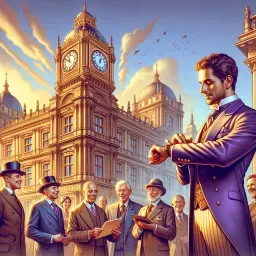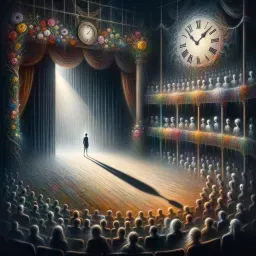”Life is what happens when you&
#039;re busy making other plans“

0
0
0
0
- Meaning
- This phrase highlights the unpredictability of life and the idea that no matter how much you plan, life often has its own agenda. It suggests that while we are busy plotting a specific course, the real essence of living unfolds in unforeseen moments and events. This underscores the value of adaptability and mindfulness in experiencing the present.
- Allegory
- This image reflects the phrase "Life is what happens when you're busy making other plans" by showcasing two contrasting paths: the structured, planned path and the winding, spontaneous one. The sunlight breaking through the clouds represents the unpredictable nature of life, while the individual’s open arms and smile capture the acceptance and appreciation of life's unexpected turns. The juxtaposition of planned milestones with unpredictable beauty visually conveys the central message of embracing the present and finding value in unpredictability.
- Applicability
- In daily life, this phrase serves as a reminder to remain present and engaged with the moment rather than being overly focused on future plans or goals. It advocates for flexibility and appreciation of unexpected experiences, encouraging individuals to find joy and meaning in the unplanned and spontaneous aspects of life.
- Impact
- The impact of this phrase on culture has been substantial, as it resonates with the universal human experience of life's unpredictability. It is frequently cited in discussions about living in the present, mindfulness, and the futility of over-planning. Artists, writers, and motivational speakers often use it to illustrate the importance of embracing life's uncertainty.
- Historical Context
- John Lennon wrote "Beautiful Boy (Darling Boy)" in 1980, during a period of semi-retirement when he was focusing on family life. The phrase reflects the personal and contemplative themes of his later works.
- Criticisms
- One potential criticism of this phrase is that it might be interpreted as minimizing the importance of planning and foresight. While spontaneity and adaptability are valuable, some argue that careful planning is essential for achieving long-term goals and stability. The phrase might also be seen as overly simplistic, not accounting for the complexities and challenges that come with balancing plans and unexpected events.
- Variations
- While variations of this phrase exist in different cultures, the core idea remains constant: life is unpredictable and often deviates from our plans. This sentiment can be found in different cultures' proverbs and sayings that emphasize the importance of living in the moment and being mindful of the present.
-

La ponctuality is the politeness of kings.
-

The only limit to our realization of tomorrow will be our doubts of today.
-

Happiness is not something ready-made. It comes from your own actions.
-

I like this place and could willingly waste my time in it.
-

So that at the name of Jesus every knee should bow, in heaven and on earth and under the earth.
-

Love is not love which alters when it alteration finds, or bends with the remover to remove.
-

Every time I mention your name, you live in my prayer.
-

Life's but a walking shadow, a poor player that struts and frets his hour upon the stage and then is heard no more.
No Comments